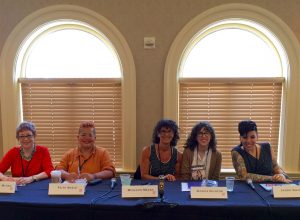
Recently I had the privilege of moderating a panel at the Bay Area Book Festival. The panel was titled “Why Write Memoir: A Conversation about Truth, Exposure, and the Genre People Love to Hate.”
The title shows a perfect combination of the issues that memoir writers struggle with. In every workshop and class I teach, the conversation that brings the most questions and angst has to do with writing the truth, feeling “too exposed,” and writing material that seems to attract pointed criticisms: memoir writers are narcissistic navel gazers, all we do is moan and groan, we see ourselves as victims, and on and on.
While a few writers may be guilty of this, most memoirists are working to tell an authentic story Because It Needs To Be Told and to give testimony about life as it is lived. One of my former students who decided to continue working on her memoir after taking a break told me, “I want to write this so I can be in charge of my story, instead of it being in charge of me.”
While I could cite statistics and studies about how writing our stories is healing—and there are many of these studies—or mention the current epigenetic research that shows how we carry inherited trauma from previous generations, the truth is that memoirists use writing as a way to ask questions that have not been asked before, to seek answers that only reveal themselves through writing. This process offers new information, firing up our nerve endings and giving us a new experience. We are changed by it. Writing comes from deep within and draws upon hidden and unconscious layers of who we are. Often we write what we didn’t know that we knew! Not all of that writing will end up in a book, these essential truths that we mine get us closer to figuring out what belongs and what needs to be told. The process is about finding out who we are as well as who we are not.
During the panel discussion the panelists—Jessica Fector, Jasmine Singer, Faith Adiele, Meredith Maran—and I talked about how each of us struggled with the “what happened?” version, fighting our own inner critics along the way. In this wrestling with the truth, and balancing that with the art and craft of shaping our own stories into books, something transformational happens. In the act of creation, we develop a new relationship with the truths in our story. Our story changes us. There were a lot of great points made but a couple of them stand out: Jasmine said that her mother was a major character in her book, and she told her that she could not read it until it was completely done, and that she had to read the WHOLE book before she commented to Jasmine about it. This gave her room to write her truth and also she took shaped her experience with her mother by offering boundaries. Faith talked about structure—there are so many ways now that memoir is being written: using subtext, journal entries, poetry, and various voices—the “you” voice in memoir is being used a lot. Feel free to experiment with your voice and your structure. Be creative and be true to your vision. My advice to memoir writers is this: write your truth, and put your worries about exposure and family voices and your own inner critic aside. Write out everything—it can be edited later. Keep a journal of your process—it helps take the heat off of writing “for the book.” Find a writing community, a supportive writing buddy and/or coach who will hold your story with respect, and cheer you on, make you accountable. Your story deserves to be told. And it won’t leave you alone until you do.
Speak Your Mind